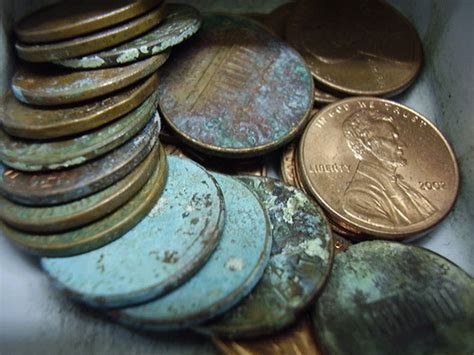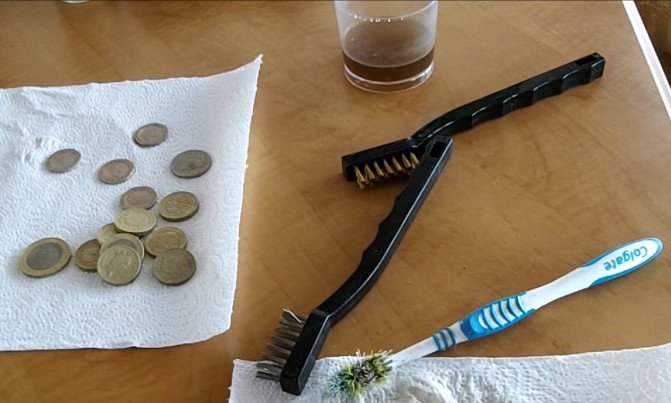It can be very tempting to clean old coins that you have acquired. Why wouldn't you want to restore dull or grimy coins to their original bright luster, so you can clearly see all their detail? But is this a wise thing to do? Will it increase the value of the coin or decrease it?
First Considerations
It may be better not to clean your coins at all. If you are collecting coins that you may want to sell in the future or coins you have bought as an investment, then the advice given by many coin-collecting specialists is to not clean them. This is because any type of cleaning can detrimentally affect the value of coins. However if your coin collection is simply a hobby and you are not interested in selling them in the future, then it's okay to clean them to bring out their beauty.
If you really feel that you need to clean valuable or collectible coins then make sure you take them to a specialist who can do it for you. But even with expert care, tiny scratches and rubbing can occur which will decrease their value.

Methods of Cleaning
There are different methods of cleaning. Only use these methods if you don't want to sell your coins in the future.
Lemon juice or vinegar can be used to remove dirt and grime- this is called "destructive" cleaning because the acid can affect the metal surface. Sometimes people add salt to vinegar or lemon juice because the resulting chemical reaction may increase the cleaning effect.
Solvents such as soap, detergent or acetone can be used to clean coins. This is known as "non-destructive" cleaning because the metal is not adversely affected.
To remove dirt and grease, some collectors use a mild detergent solution, such as dishwashing liquid with ordinary water. However, some numismatic organizations advise against this and advise using a weak soap solution instead, made with distilled water. This is because household water contains chlorine which can cause discoloration of the metal.
One source of the solvent acetone is nail polish remover, but this contains other ingredients that can damage higher quality coins. Pure acetone can easily be bought to use instead.
An ultrasonic jewelry cleaner can be used (again, only with coins which are not valuable or not going to be sold). If using this method make sure you change the cleaning solution frequently, clean only one coin at a time, and always follow the manufacturer's instructions.
Steps for Cleaning Coins
First remember to always handle your coins by the edges and never by the surfaces. Even though the coins you're about to clean are probably not very valuable, it's good to get into the habit of handling coins properly.
- Wash your hands before you start. Grease and dirt from your hands can damage coins.
- Wash the coin with cold water.
- Hold the toothbrush under warm water to soften the bristles, then use a small amount of soap on the brush to loosen any dirt. Only clean the dirty areas of the coin, and make sure to rinse the coin and the brush frequently to prevent dirt from scratching the surface.
- If necessary, remove any encrusted dirt by gently removing it with a toothpick or a small screwdriver. Try not to damage the surface. A good light and/or a magnifying glass will be useful here.
- Pour a little vinegar over the coin. After 10 minutes, brush with a soft toothbrush. Lemon juice can be used instead of vinegar.
- Hold the coin again under warm, running water (preferably distilled water) to rinse off the acid. If it needs more cleaning, soak it again in vinegar or lemon juice. Always remembering to rinse afterwards in warm water.
- Pat the coin dry with a soft, lint-free cloth and leave it to dry on a soft cloth.
Very dirty coins can be left to soak in olive oil for a few months if necessary. This won't damage the coin, but it should remove encrusted grime. You can then wash the coins in a mild soap solution, as detailed above.

What Not to Do
If you want to clean your coins then it's important to also know what not to do.
- Don't use commercially-advertised metal cleaners to clean your coins because they can remove a small amount of surface metal. Although some people say it's fine to use them, specialist websites advise against their use.
- Don't soak copper coins in the same solution as non-copper ones. The copper can react with the cleaning solution and discolor the silver coins.
- Never rub coins, even with a soft cloth. Always pat them dry.
- Don't put your coins through a rock tumbler used for polishing stones- it will destroy your collection!
- It's best not to buy coins that have been cleaned. Some of their value is likely to have been lost.
Materials Needed
The materials needed for cleaning coins are usually household items.
- Plastic bowl or similar container
- Cold and warm running water
- Lemon juice or vinegar
- A soft, lint-free cloth (e.g. linen)
- Toothbrush- soft or extra soft
- Toothpick or a small screwdriver
- Magnifying glass
Collecting coins is a fascinating hobby. Many people regard their coin collection as an investment, to be built up over time, with the possibility of buying and selling coins in order to increase the value of the collection.
It seems counter-intuitive that dull, dirty coins could possibly hold more value than clean, shiny ones, but this really is the case. Cleaning off grime can cause the surface to become scratched or rubbed. This is why it's strongly recommended not to clean valuable coins. So if you want your coins to work for you and increase in value, then you will have to learn to love even the grimiest ones, just as they are.
